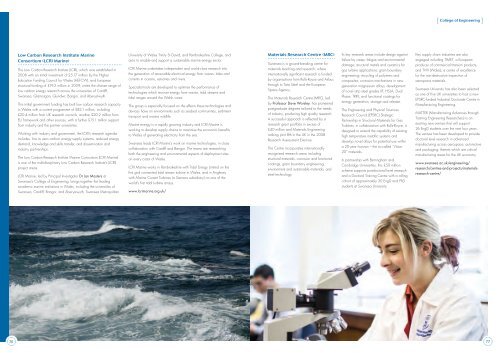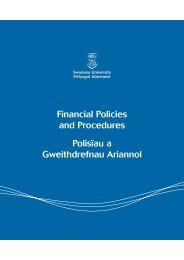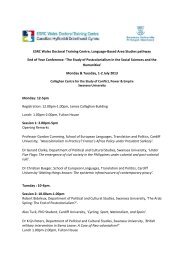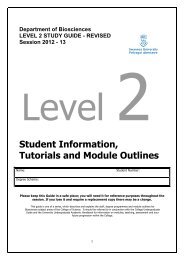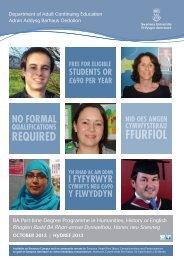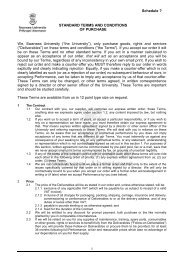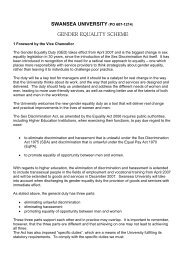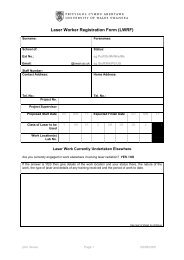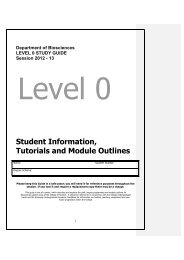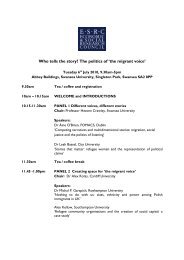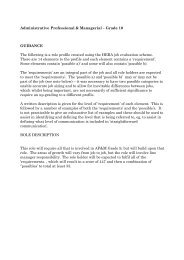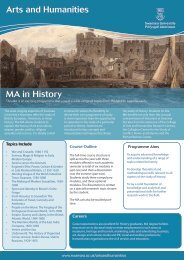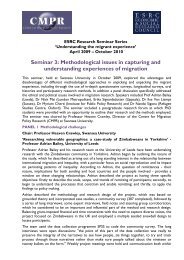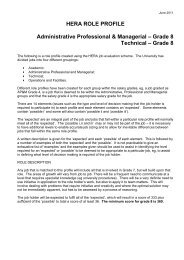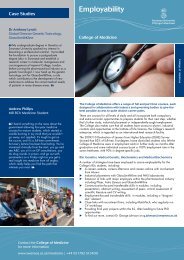Breakthrough 2013 (PDF) - Swansea University
Breakthrough 2013 (PDF) - Swansea University
Breakthrough 2013 (PDF) - Swansea University
Create successful ePaper yourself
Turn your PDF publications into a flip-book with our unique Google optimized e-Paper software.
]<br />
College of Engineering ]<br />
Low Carbon Research Institute Marine<br />
Consortium (LCRI Marine)<br />
The Low Carbon Research Institute (LCRI), which was established in<br />
2008 with an initial investment of £5.17 million by the Higher<br />
Education Funding Council for Wales (HEFCW), and European<br />
structural funding of £19.2 million in 2009, unites the diverse range of<br />
low carbon energy research across the universities of Cardiff,<br />
<strong>Swansea</strong>, Glamorgan, Glyndwr, Bangor, and Aberystwyth.<br />
This initial government funding has built low carbon research capacity<br />
in Wales with a current programme of £82.1 million, including<br />
£20.4 million from UK research councils, another £20.2 million from<br />
EU framework and other sources, with a further £15.1 million support<br />
from industry and the partner universities.<br />
Working with industry and government, the LCRI’s research agenda<br />
includes, low to zero carbon energy supply systems, reduced energy<br />
demand, knowledge and skills transfer, and dissemination and<br />
industry partnerships.<br />
The Low Carbon Research Institute Marine Consortium (LCRI Marine)<br />
is one of the multidisciplinary Low Carbon Research Institute’s (LCRI)<br />
project areas.<br />
LCRI Marine, led by Principal Investigator Dr Ian Masters at<br />
<strong>Swansea</strong>’s College of Engineering, brings together the leading<br />
academic marine institutions in Wales, including the universities of<br />
<strong>Swansea</strong>, Cardiff, Bangor, and Aberystwyth, <strong>Swansea</strong> Metropolitan<br />
<strong>University</strong> of Wales Trinity St David, and Pembrokeshire College, and<br />
aims to enable and support a sustainable marine energy sector.<br />
LCRI Marine undertakes independent and world-class research into<br />
the generation of renewable electrical energy from waves, tides and<br />
currents in oceans, estuaries and rivers.<br />
Specialist tools are developed to optimise the performance of<br />
technologies which recover energy from waves, tidal streams and<br />
tidal ranges around the Welsh coast.<br />
The group is especially focused on the effects these technologies and<br />
devices have on environments such as seabed communities, sediment<br />
transport and marine wildlife.<br />
Marine energy is a rapidly growing industry and LCRI Marine is<br />
working to develop supply chains to maximise the economic benefits<br />
to Wales of generating electricity from the sea.<br />
<strong>Swansea</strong> leads LCRI Marine’s work on marine technologies, in close<br />
collaboration with Cardiff and Bangor. The teams are researching<br />
both the engineering and environmental aspects of deployment sites<br />
on every coast of Wales.<br />
LCRI Marine works in Pembrokeshire with Tidal Energy Limited on the<br />
first grid connected tidal stream turbine in Wales, and in Anglesey<br />
with Marine Current Turbines (a Siemens subsidiary) on one of the<br />
world’s first tidal turbine arrays.<br />
www.lcrimarine.org.uk/<br />
Materials Research Centre (MRC)<br />
<strong>Swansea</strong> is a ground-breaking centre for<br />
materials teaching and research, where<br />
internationally significant research is funded<br />
by organisations from Rolls-Royce and Airbus<br />
through to Tata Steel and the European<br />
Space Agency.<br />
The Materials Research Centre (MRC), led<br />
by Professor Dave Worsley, has pioneered<br />
postgraduate degrees tailored to the needs<br />
of industry, producing high quality research.<br />
A successful approach is reflected by a<br />
research grant portfolio in excess of<br />
£40 million and Materials Engineering<br />
ranking joint 8th in the UK in the 2008<br />
Research Assessment Exercise.<br />
The Centre incorporates internationally<br />
recognised research areas including<br />
structural materials, corrosion and functional<br />
coatings, grain boundary engineering,<br />
environment and sustainable materials, and<br />
steel technology.<br />
Its key research areas include design against<br />
failure by creep, fatigue and environmental<br />
damage; structural metals and ceramics for<br />
gas turbine applications; grain boundary<br />
engineering; recycling of polymers and<br />
composites; corrosion mechanisms in new<br />
generation magnesium alloys; development<br />
of novel strip steel grades (IF, HSLA, Dual<br />
Phase, TRIP); and functional coatings for<br />
energy generation, storage and release.<br />
The Engineering and Physical Sciences<br />
Research Council (EPSRC) Strategic<br />
Partnership in Structural Materials for Gas<br />
Turbines, in collaboration with Rolls-Royce, is<br />
designed to extend the capability of existing<br />
high temperature metallic systems and<br />
develop novel alloys for potential use within<br />
a 20-year horizon – the so-called “Vision<br />
20” materials.<br />
In partnership with Birmingham and<br />
Cambridge Universities, this £50 million<br />
scheme supports postdoctoral level research<br />
and a Doctoral Training Centre with a rolling<br />
cohort of approximately 30 EngD and PhD<br />
students at <strong>Swansea</strong> <strong>University</strong>.<br />
Key supply chain industries are also<br />
engaged including TIMET, a European<br />
producer of commercial titanium products,<br />
and TWI (Wales), a centre of excellence<br />
for the non-destructive inspection of<br />
aerospace materials.<br />
<strong>Swansea</strong> <strong>University</strong> has also been selected<br />
as one of five UK universities to host a new<br />
EPSRC-funded Industrial Doctorate Centre in<br />
Manufacturing Engineering.<br />
MATTER (Manufacturing Advances through<br />
Training Engineering Researchers) is an<br />
exciting new venture that will support<br />
26 EngD students over the next four years.<br />
The venture has been developed to provide<br />
doctoral level research in advanced<br />
manufacturing across aerospace, automotive<br />
and packaging; themes which are critical<br />
manufacturing areas for the UK economy.<br />
www.swansea.ac.uk/engineering/<br />
research/centres-and-projects/materialsresearch-centre/<br />
76<br />
77


